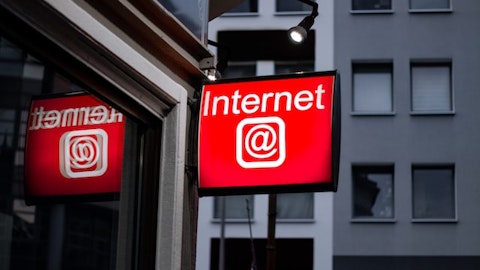Opera Limited (NASDAQ:OPRA) Q2 2023 Earnings Call Transcript August 24, 2023
Opera Limited misses on earnings expectations. Reported EPS is $0.15 EPS, expectations were $0.17.
Operator: Welcome to the Opera Limited Second Quarter 2023 Earnings Call. At this time, all participants are in a listen-only mode. After the speakers’ presentation, there will be a question-and-answer session. [Operator Instructions] Please be advised that today’s call is being recorded. [Operator Instructions] I would now like to turn the call over to your speaker today, Matt Wolfson, Head of Investor Relations. Please go ahead.
Matthew Wolfson: Thanks for joining us. As usual, I have with me today our Co-CEO, Song Lin; and our CFO, Frode Jacobsen. Before I hand the call over to Song, I would like to remind everyone that in the conference call today, the company will be making statements about its future results and expectations, which constitute forward-looking statements within the meaning of the Private Securities Litigation Reform Act. Such statements are based on current expectations and how we perceive the current economic environment and are inherently subject to economic, competitive and other uncertainties and contingencies beyond the control of management. You should be cautioned that these statements are not guarantees of future performance.

Stasique/Shutterstock.com
You may refer to the Safe Harbor statement in the company’s earnings release for details. Our commentary today will also include non-IFRS financial measures, including adjusted EBITDA, which are different from our consolidated financial statements that are prepared and presented based on IFRS. We believe that the use of non-IFRS financial measures provides an additional tool for investors to use in evaluating ongoing operating results and trends. These measures should not be considered in isolation or as a substitute for financial information prepared in accordance with IFRS. We have also posted unaudited quarterly historic financial results of Opera on our Investor Relations website. We will be live posting highlights from the call at Investor Opera, so please follow along there during the call and in the future.
With that, let me turn the call over to our Co-CEO, Song Lin, who will cover our second quarter operational highlights and strategy and then Frode will discuss our financials and expectations going forward.
Lin Song: Sure. Thanks, Matt, and thank you everyone for joining us today. So we are very pleased to announce another very strong quarter, which exceeded our previously issued guidance for both revenue and profitability. The first half of the year is off to a great start and we are happy to be able to raise our 2023 guidance today. Second quarter revenue reaches $94.1 million, an increase of 21% over the previous year. This was our tenth consecutive quarter of over 20% top line growth. Adjusted EBITDA was $20.5 million, a 22% margin. The second quarter builds upon our previous successes and communicated strategy on focusing on growth in the Western markets with the potential for the greatest value. So to those of you who have been following the Opera story, this is nothing new.
Annualized ARPU was $1.17 in the second quarter, an increase of 25% compared to last year and up 80% relative to the first quarter. While our total user base was relatively stable, we continued our user base mix shift towards higher ARPU users, with users in western markets, representing 15% of the total user base. Advertising revenue grew 25% compared to last year representing 57% of total revenue and continues to benefit from the underlying growth in our audience extension business on top of our O&O advertising. Search revenue grew 15% in the second quarter, driven by continued user growth in Western markets. Opera has a track record of innovating ahead of the browsers that come with operating systems and bringing new user-friendly technology to its browsers.
With our long history of giving users direct access to the Internet’s most in-demand platforms, we have expanded our existing AI program for our browsers, news and gaming products, taking advantage of our own solutions as well as new and existing partnerships. To make sure our users get the best technologies and solutions available. We first partnered with OpenAI, maker of the ChatGPT and our close collaboration has already yielded some impressive results. We have decided to go back to the drawing board and redesign our flagship desktop browser, reshaping the UX and UI to both improve the user experience and prepare the platform for current and upcoming AI features. With Opera One, we managed to create a powerful feature rich browser that dynamically adapts to our users’ needs, designed to embed all the current AI technologies and leave considerable room for more.
We are excited about Opera One and a high-quality platform for the future of AI-enhanced web browsing. This redesigned browser was met with overwhelmingly positive feedback from both users and tech media. Opera One was the first of all browsers to include our browser AI Aria as a well-connected and current event aware generative AI service, offered entirely for free, Aria marks new beginning of a new kind of browsing insurance for Opera users. Aria allows users to collaborate with AI while browsing the web, generating text or codes or getting their product queries answered. Aria is based on Opera’s own component infrastructure, which is connected to OpenAI ChatGPT technology. In addition, Aria is further enhanced by additional capabilities such as adding live results from the web.
The component infrastructure is also easily scalable. It allows Aria to connect to multiple AI models and in the future well expand by integrating further capabilities such as direct users to relevant services powered by our key partners for monetization. Aria is also available in our mobile browsers for Android and iOS allowing users to enjoy AI-powered browsing on the goal. It has proven to be a hit with users, and they are clearly enjoying the experience as evidenced by a lift in total time spent as well as increased search queries and page views position. Opera is looking forward to developing more cutting edge AI solutions first bringing Aria to all our major platforms various projects on the immediate horizon, but the bar continues to be set high as we strive to be the vendor of technological innovation.
Opera GX continues to grow its user base, up another 9% sequentially to 24 million during the quarter with an annualized ARPU of $3.10, an increase of 7% compared to the second quarter of 2022. Monetization grows faster on PC than mobile, given greater western exposure on the PC side. In addition to being engaged with gamers, GX has a very attractive demographic, predominantly Gen Z. With Opera GX, we have enabled those gamers to differentiate themselves from others in a way their Internet experience matches both the look and feel of their broader setups and connects them directly to the services they use. For an online native generation, this individualism extends from the physical world to a digital one and we provide GX as a key part of that expression and experience.
So in this call, we have added even more features to Opera GX with thousands of new modes and live wallpapers and we think some of our users will appreciate the addition of AI to GX in time to help with their homework in the coming school year. The pace of innovation so far this year showcases our ability to react and take advantage of rapidly evolving technologies and offer unique browsing experiences to our users. As we move through the remainder of the year, you can expect this to continue with Aria coming to more browsers, new AI features and skills being rolled out and GX continuing its growth as the leading browser for demanding gamers. With that, let me turn the call over to Frode.
Frode Jacobsen: Thank you, Song. I’ll then turn to some additional details on our numbers and capital returns within yet another strong quarter for Opera. Our Q2 revenue benefited from solid underlying growth of both advertising and search revenues in spite of FX headwinds. As a result, we came in just above the high end of our guidance at $94.1 million or 21% year-over-year growth. On an FX-neutral basis, our year-over-year growth would have been about 28%. We do observe examples of volatility amongst advertisers in the current macroeconomic picture, but our underlying user base mix shift towards higher ARPU users continues to benefit our trajectory even as Western users still only represent 15% of our total user base. In line with our revenue performance, adjusted EBITDA also came in just above the top end of guidance at $20.5 million or 22% margin.
Overall, our cost categories came in according to our expectations with a slight shift from marketing expenses to cost of revenue items. We generated operating cash flow of $15.5 million in the quarter, which is net of $3.4 million tax prepayments. Free cash flow from operations, which subtracts CapEx items and lease payments from our operating cash flow was $13.2 million. During the quarter, we launched a recurring dividend program. The annual dividend is $0.80 per ADS to be paid semi-annually. The record date for the first $0.40 payment was in June with payments in July. Our first recurring dividend amounted to $36 million in total. Of which $11 million was paid in cash to ADS holders and $25 million was offset against our receivable from the sale of Star X.
We did not repurchase any shares under our buyback program in the quarter. As previously communicated, further buybacks will be conducted in an opportunistic manner as we focus on dividends as our main avenue of capital returns. Finally, our balance sheet remains very healthy with $98 million of cash and no corporate debt. In addition, our receivable from the sale of Star X totals $32 million present value, which is presented net of the first dividend offset and which will continue to reduce our cash expense of dividends until it has been fully consumed. We continue to value our 9.5% stake in OPay at $163 million, presented as held for sale. In total, that adds up to $196 million of balance sheet value in addition to our cash position. Now turning to our updated guidance for the full year 2023 and the third quarter.
Given our continued strong trajectory, we are yet again raising our guidance for the year on both revenue and adjusted EBITDA. We continue to reflect caution given the broader macroeconomic picture, but the core trajectory of Opera and our products and user base results in a net positive impulse to our outlook and ranges used. On full year revenue, we now guide $380 million to $390 million, up from our last range of $373 million to $390 million, which corresponds to 16% revenue growth at the midpoint. For annual adjusted EBITDA, we lift our guidance range to be $80 million to $84 million, up from $77 million to $83 million, representing a 21% margin at the midpoint. In terms of cost expectations, our commentary from prior quarters still stands.
We expect marketing costs to be higher in the second half and build in a bit below $120 million for the year. Cost of revenue items will likely remain around current levels relative to revenue, resulting in a percentage in the low 20s. Cash compensation expense is still expected to increase modestly relative to 2022 and all other OpEx items before adjusted EBITDA remains expected to come in at just above $30 million for the year as a whole. For the third quarter, we guide revenue to $97 million to $100 million, which is 15% growth at the midpoint. We guide adjusted EBITDA to $18.5 million to $20.5 million, translating to a 20% margin at the midpoint. Overall, and to conclude, we’ve obviously never been more successful, and we are very pleased with our product lineup, road maps and our growth strategy.
We are also proud to combine healthy growth with healthy profit margins and cash flows and how that directly benefits our shareholders through our past major stock buybacks and a special dividend earlier this year and most recently with initiation of a recurring dividend. While it’s certainly a period of near to midterm macro volatility, it is also one of the most exciting periods for Opera as a company with the emergence of new technologies, and developments of new ways to better serve and engage with Internet users. So we’ll do our best to fire on all cylinders as the year progresses and look forward to keeping you posted. So that’s it for me, and I’ll turn the call back over to the operator for questions.
See also 10 Best Performing ETFs in 2023 and 11 Most Undervalued Dow Stocks To Buy According To Hedge Funds.
Q&A Session
Follow Opera Ltd (NASDAQ:OPRA)
Follow Opera Ltd (NASDAQ:OPRA)
Receive real-time insider trading and news alerts
Operator: Thank you. [Operator Instructions] We’ll take our first question from Mark Argento with Lake Street. Your line is open.
Mark Argento: Good morning, guys, and nice quarter. Just wanted to drill down a little bit on your expectations for kind of ARPU growth going forward. It looks like it was up a little bit here in the quarter and you continue to kind of increase your exposure to the Western markets. Is that a sustainable trend? What kind of what do you guys — how do you think about strategically about ARPU growth in terms of your overall strategy trying to get more exposure to the West?
Frode Jacobsen: Hey, Mark. Thanks. I can begin in terms of our guidance. We continue to build in the trend of ARPU growth. We see our momentum in Western markets and our growth there is happening actually across PC, GX and mobile products. So that’s an important driver for us. And in addition, we have GX, which is indeed a success story, but I think it’s still under-indexing on advertising relative to our classic PC browsers. It’s just newer in its development. So we do see headroom there.
Mark Argento: Great. And then in terms of the relaunch of Opera One and the AI, some of the embedded AI tools. Any trends you’re seeing? Are you getting some decent adoption, utilization of those tools. What’s your goal, I guess, for that product and the opportunity to kind of mainstream that browser or the browser set?
Lin Song: Yeah. It’s Song Lin. I’ll try to answer. So yeah, I think, as mentioned, we are quite — I mean, it’s still early stage, but it is very encouraging for what we see, more like among the users who have been using it. We have seen that there are actually very interesting like because we know there are discussions about what the impact is going to be to the whole industry and user behavior or whatever. So what we see at least even from the early stages are that before we actually introduce AI and afterwards, even for the same group of users, they are very nice upward turnings of both the user engagement time spent and even search queries among others, right? So all the numbers are lifting and we think it makes sense because more like because it actually enables users to interact with AI and computer in a more natural way and in turn of course bring more exposure to all the informations.
And this is of course very relevant for us as a browser because at the end of the day, browser is a gateway, allow user to discover more information. And if AI can actually help that, it’s very natural that you guys have to spend more time on it. So we are very positive. And the other major, I would say, interesting factor, of course, is that is also a major differentiating part because what we saw is also that is actually going to Opera One for instance, it’s a very good tool to use it as a way to getting new users because now people also see that there are clearly more differentiation between Opera and Open One where the preinstalled browser on the PC, which is, of course, a very positive mega trend that people begin to get it more that the browser can actually play a difference and especially with AI.
So all those are playing a very positive factor. But again, it’s still early stage. So I think we’ll see how this develops and we will roll out probably more of the iterations of the AI just to make sure we are moving even faster.
Mark Argento: That’s helpful. And then one more just kind of housekeeping question for Frode. In terms of the dividend, you guys are instituting a recurring dividend, the first installment, the first $0.40 dividend you guys are netting that against the receivable, but then going forward, is it a full $0.40 dividend? Or maybe just walk us through that.
Frode Jacobsen: Yes. I think the Star X receivable was about $57 million before this dividend. Just as a reminder, we sold Star X, our stake in Star X to Kunlun, which is also the biggest shareholder in Opera and that is why we use the offsetting mechanism. So the first dividend that as a pre-IPO shareholder, their part of it would have been $25 million. And so that reduced the Star X receivable to about $32 million at the end of the quarter. And we’ll see — continue to see at $0.40 per dividend issuance. So you’ll see about a $25 million reduction in that until it has been consumed. So it will last us into about mid-2024.
Mark Argento: Got it. All right. That’s helpful. And then just last — I know you carry it on the balance sheet as available for sale, I think, is a classification. Any additional thoughts on that asset, that stake and any kind of new valuation marks? When you guys think about what that business is worth? And more importantly, what do you do with that stake long-term?
Frode Jacobsen: Yes. For the first half, we had another look at it. In general, we felt comfortable with the valuation that we set back in March, I believe, for year-end ’22. I think the company is doing well and it’s proceeding. We’re not in a rush to sell it per se. But if there is an interested buyer, we also no longer really play a strategic role for OPay in its operations. I think our role was more important in the early days as a founding member of the company. So then in terms of just our own simplification would be happy to sell it at the right price.
Mark Argento: All right. Appreciate it. Thanks, guys.
Operator: And we will take our next question from Lance Vitanza with TD Cowen. Your line is open.
Lance Vitanza: Thanks. Thanks, guys, and nice quarter. I have two questions. I guess the first is back on the idea of how much headroom you think you have in this transition into the Western markets, which obviously is fueling the rapid growth that we’ve seen. So if I do the math right, it looks like you’ve got about 47 million users in the Western markets, just 15% of the $316 million user base that you reported in the press release. So that works out to about rough numbers an estimated 8% penetration if I just divide that $47 million by the total population of the Western markets. So I’m wondering I imagine, Opera, its goal isn’t to be a real mass channel brand, but do you think that, where do we think that, that penetration rate could conceivably go over time? I mean is there an opportunity to double that to 16% or is that too aggressive or too conservative? How should we be thinking about where this could go over the longer term? Thanks.
Lin Song: Yeah. So, yeah, it’s Song Lin. I’ll comment a bit and Frode can also add, right. So, no, I think you are right that I think it’s functioning more like it in any way, right? So first of all, of course Opera has a really one of the biggest European brands. It’s just the fact that we have such a huge user base, right? So which is positive as a total MAU like not so many company actually like us to have so many users. But I think you’re are also right that even though we have been growing and we have a big user base, even in Western world, it’s still only 15%, right? So we feel that I agree with you that we feel there are still a lot of we feel we are still at very early stage of penetration, both for GX, for instance, which is always very high ARPU users wherever they are in more like, you know, even if they are in other markets, game are always very high ARPU.




